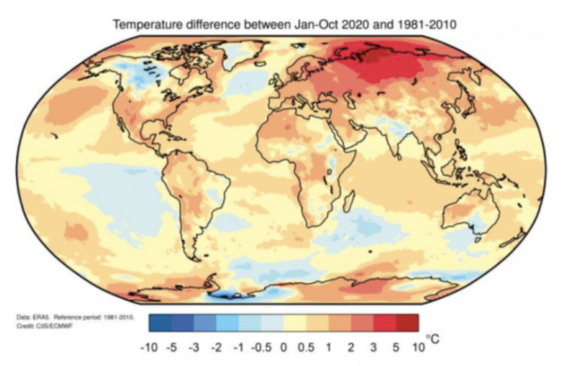
The annual report issued by the World Meteorological Organisation (WMO) at the beginning of December paints a grim picture regarding the global climate. The WMO is the specialised agency of the United Nations for meteorology (weather and climate) and represents193 Member States and Territories.
In preparing its 2020 report the WMO looked at 7 key indicators, all of which give rise to serious concern: (click on the highlighted link to learn more about each indicator)
1. Greenhouse gases, especially carbon dioxide (CO2) and methane (CH4) all reached new highs in concentration, this despite an expected reduction due to COVID-19. Greenhouse gas levels are a major driver of climate change.
2. Ocean acidification has continued to increase steadily due to absorption of increased levels of CO2 endangering aquatic life and impacting on fisheries and coral reefs.
3. Global surface temperature. This was found to be around 1.2 C warmer than pre-industrial levels, with 2020 expected to be one of the three warmest years on record and the past decade, 2011-2020, the warmest ever recorded.
4.Extreme weather events. (Floods, fires, droughts, heat waves and severe storms) Rising global temperatures have contributed to increased and more intense extreme weather events around the world.
5.Ocean heat content. Data indicates that ocean warming rates show a particularly strong increase in the past two decades and across all depths with a significant impact on marine life.
6. Sea level rise. Global sea level continues to rise, reaching a peak in 2020. At the current rate sea levels are expected to rise between 0.3-18 m by the end of the century impacting 600 million people worldwide who live in coastal areas and with salt-water contaminating drinking water supplies.
7 Glacial mass. Ice sheets around the world continue to lose mass. An estimated 152 000 000 000 tonnes of ice were lost between Sep 2019 and Aug 2020.
In the face of this information one is tempted to despair, however there is still time to avert the worst of the looming catastrophe if governments take action. Some signs of hope can be found in the commitments made by States in the recent Climate Ambition Summit marking the 5th anniversary of the Paris climate accord. News that the USA will rejoin the Paris agreement under President-elect biden was welcomed, but absent from the event were major economies such as Australia, Brazil, Indonesia, Mexico, Russia and Saudi Arabia. Most of whom have offered no significant improvements on their existing emissions targets recently.
Those of us who live in a functioning democracy can send a message to our parliamentary representatives urging them to action and fulfil their commitments and we can support campaigns organised by groups such as Avaaz and 350.org